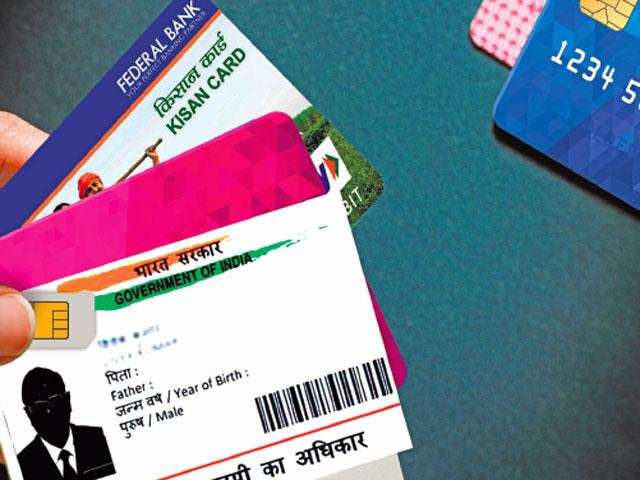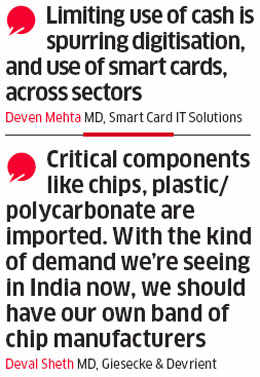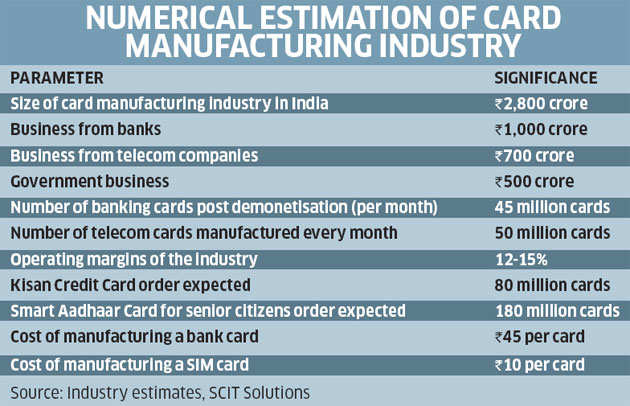 Days after launch of the demonetisation drive early in November 2016, Deven Mehta, managing director of Smart Card IT Solutions, expanded production capacity of his ‘bank card vertical’ seven-fold. A tidal surge in demand for new debit and credits cards prompted Mehta to do so.
Days after launch of the demonetisation drive early in November 2016, Deven Mehta, managing director of Smart Card IT Solutions, expanded production capacity of his ‘bank card vertical’ seven-fold. A tidal surge in demand for new debit and credits cards prompted Mehta to do so.“We were not able to complete new orders coming in from banks… We even had to limit fresh order intake briefly,” says Mehta, still wonderstruck by the steep rise in demand for cards over the past few months.
Smart Card IT Solutions (SCIS) makes 3.3 lakh bank cards every day — that’s almost one crore cards every month. At the industry level, comprising over a dozen smart card manufacturers, purchase orders for new bank cards have gone up from 1.5 crore in the ‘pre-demonetisation era’ to over five crore cards per month currently.
“The government’s digital push is helping us big-time. Limiting the use of cash is spurring digitisation — and the use of smart cards — across sectors,” says Mehta.
Business has never been so good for smart card manufacturers. Apart from banks, they are flooded with orders from telecom biggies for SIM cards, loyalty cards for consumer businesses, toll access strips for logistic firms and prospective bulk orders from central and state governments for Aadhaar, e-passports, health and Kisan cards.
According to industry executives, the Rs 2,800-crore smart card manufacturing industry is growing at 10-15% every year, with average operating margins in the range of 12-15%. Smart card manufacturers derive a large chunk of their business from banks.
The industry is estimated to have received (credit and debit) card orders worth Rs 1,000 crore in the current fiscal. Telcos and government orders (for driving licences, vehicle registration cards and health cards) trail the banking sector with orders of Rs 500-700 crore.
 “Business volumes have definitely risen over the past year, but not much in terms of value. Card manufacturing prices have come off but that drop is now getting negated by higher volumes,” explains Deval Sheth, managing director, Giesecke & Devrient (G&D), a card manufacturer.
“Business volumes have definitely risen over the past year, but not much in terms of value. Card manufacturing prices have come off but that drop is now getting negated by higher volumes,” explains Deval Sheth, managing director, Giesecke & Devrient (G&D), a card manufacturer.“Critical components like chips, plastic/polycarbonate are imported by manufacturers,” reasons Sheth. “With the kind of demand we’re seeing in India now, we should have our own band of chip manufacturers.”
India is one of the largest importers of silicon chips. According to a report by Novonous, a business consulting firm, the country’s semiconductor industry is estimated to grow over 26% every year to $52.58 billion by 2020.
Big Banking Business
A bank card is made — end to end — in less than two minutes. The cost of manufacturing Europay, MasterCard, Visa (EMV) chip cards is roughly Rs 45 for each. Chip cards, according to experts, offer one of the most secure conduits for banking transactions.
That’s precisely why banking regulators around the world — including the Reserve Bank of India —want all banks to start moving from magnetic stripe cards to chip-embedded EMV. This migration to chip-enabled cards presents a great business opportunity for manufacturers.
“Some 300 million magstripe cards will have to be converted to chip cards over the next two years; this also includes Jan Dhan account cards offered to new bank customers in rural India,” says Sheth of G&D.
“That apart, more customers are being acquired by banks … New payment banks, small finance banks and travel and forex card market offer steep growth opportunities for card manufacturers,” Sheth adds.
Increase in the use of bank cards (over cash) — especially after demonetisation — is also shovelling in business for card manufacturers. The number of bank card transactions (both credit and debit) has gone up from 110 crore swipes in 2013-14 to over 200 crore deals two years later.
“The number of active users of bank cards is definitely rising… A card is now a part of the welcome kit for all new bank accounts,” says Ambuj Chandna, senior executive vice-president, Kotak Mahindra Bank.

On normal card transactions, banks charge a fee from merchants for usage and maintenance of the payments infrastructure (POS machines, et al) at the merchant outlet. A portion of this levy goes to payment network providers (Visa, Rupay and Mastercard), while the remaining sum goes into bank coffers as interchange income for facilitating card issuance activities.
Card manufacturers import raw electronic chips at Rs 8-15, depending on the quality. Programming and personalising these chips would require another Rs 20-25 per piece; Rs 8–10 is spent designing the card overlay. The final price of the card would change with quality of the plastic used.
High quality polycarbonate cards are expensive, but they last really long. Bank cards have a lifespan of three to 10 years but banks are obligated to issue new cards if existing ones are worn out or defaced. “Cards, as a bank transaction medium, will be in use for a long time. It’s tested for cost, risk and convenience,” says Chandna.
Mobile apps (applications) enabling payment/bank transactions pose the biggest threat to bank cards. Embedded mobile pay —where card coordinates are cloned onto a smartphone — may eat into the cards business but that may take a while.
Mobile wallets (Paytm and Mobikwik) could challenge the utility value of cards but only if they are able to retain their existing customer base. “E-wallets will have to find more suitable economic models,” says Chandna. “Till such time, cards will be the choice medium of transaction for many millions.”
Telecom Business Calling
The emergence of Reliance Jio, industry-level consolidation, massive customer enrolment drives and soaring usage of data and mobile commerce will ring in more business for card manufacturers. Migration of customers from 2G to better networks (3G and 4G) would necessitate several millions of new SIM cards.
According to a recent Grant Thornton report on m-commerce, about 70% of mobile users in India rely on 2G networks. But this will change once tariff rates become more affordable to the masses. Mobile internet penetration in India is estimated at 371 million users currently.
“Data revolution has just started… Currently, just 15% of mobile owners use data. This will change in the years to come as 600-800 million users will use data over the next two years,” says Rajan Mathews, director general, Cellular Operators Association of India.
The transition from feature to smartphones will also trigger need for new SIMs. India has close to 300 million smartphone users, as per Grant Thornton estimates. “The customer base is widening rapidly — 2-3 million new mobile subscribers are added every month in India. The replenishment market (lost SIM cards, number portability cases, et al) is also thriving,” says Mathews. “SIM card manufacturers will register stupendous growth in volumes.”
SIM cards are manufactured at Rs 8-10 per piece. “We don’t expect super-growth (from telecom orders) in terms of revenues but our business volumes would definitely go up,” says Sheth of G&D.
Government Tenders
If everything goes as planned, the government may float tenders to manufacture close to 80 million Kisan Credit Cards, national ID cards for the entire populace (roughly 130 crore people), 180 million smart Aadhaar cards for senior citizens (in the first phase) and chip-card inlays for over 70 million passport holders.
“New programmes apart, we’ll continue to manufacture driving licence smart cards, vehicle registration certificate cards and health cards for various states,” says Mehta of SCIT Solutions. “Government business will turn out to be a big revenue earner for card manufacturers.”
Card manufacturing is a high-precision industry and it involves transfer of personal data (from service providers such as banks and telecom companies) to third party product vendors. Data security is important in this business.
Vijay Rathour, vice-president, Stroz Friedberg, a computer forensics and electronic discovery technical services firm, reckons card manufacturers and printers cannot afford to ignore the risk of cyber-attacks any longer.
“Printers holding confidential data, or frankly any kind of personally identifiable data, are as likely to be a target as other organisations,” he said in a recent interview to Printweek, a print industry chronicler. “If I was thinking of a soft target — an old-school business that doesn’t make security a high priority — then printers would certainly be on that list,” he warns.
It’s high time service providers conducted proper due diligence — beyond cost and locational advantages — before giving bulk card manufacturing orders.


0 comments:
Post a Comment